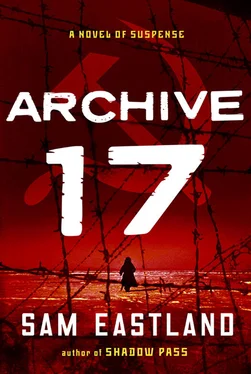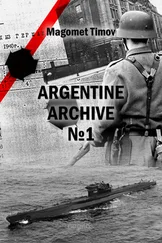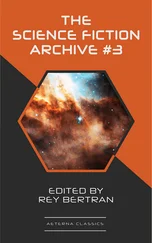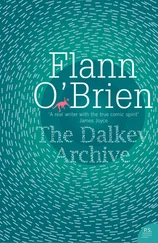Sam Eastland - Archive 17
Здесь есть возможность читать онлайн «Sam Eastland - Archive 17» весь текст электронной книги совершенно бесплатно (целиком полную версию без сокращений). В некоторых случаях можно слушать аудио, скачать через торрент в формате fb2 и присутствует краткое содержание. Жанр: Исторический детектив, на английском языке. Описание произведения, (предисловие) а так же отзывы посетителей доступны на портале библиотеки ЛибКат.
- Название:Archive 17
- Автор:
- Жанр:
- Год:неизвестен
- ISBN:нет данных
- Рейтинг книги:3 / 5. Голосов: 1
-
Избранное:Добавить в избранное
- Отзывы:
-
Ваша оценка:
- 60
- 1
- 2
- 3
- 4
- 5
Archive 17: краткое содержание, описание и аннотация
Предлагаем к чтению аннотацию, описание, краткое содержание или предисловие (зависит от того, что написал сам автор книги «Archive 17»). Если вы не нашли необходимую информацию о книге — напишите в комментариях, мы постараемся отыскать её.
Archive 17 — читать онлайн бесплатно полную книгу (весь текст) целиком
Ниже представлен текст книги, разбитый по страницам. Система сохранения места последней прочитанной страницы, позволяет с удобством читать онлайн бесплатно книгу «Archive 17», без необходимости каждый раз заново искать на чём Вы остановились. Поставьте закладку, и сможете в любой момент перейти на страницу, на которой закончили чтение.
Интервал:
Закладка:
Alone, he turned and trudged back up the trail, following the Ostyaks, the frail glow of his lamp growing fainter as the trees closed up around him.
Kirov’s Emka skidded to a halt outside the control room of Afanasiev airport, a small installation reserved for military flights.
He had followed Stationmaster Kasinec’s directions to the nearest airfield, only a five-minute drive north of the V-4 railway station.
“I will notify the airfield you are coming!” Kasinec had shouted as Kirov got into his car. “I’ll tell them you are bound for Vladivostok!”
Out on the runway, a plane had just taxied into position, ready for takeoff. The machine was painted green, with red stars on its wings and tail. It had a long cockpit canopy to accommodate both a pilot and a navigator/gunner.
Kirov cut his engine, bolted from the car, and ran inside the control room.
The traffic controller sat behind a radio, mouse-eared by a large set of headphones. “Are you Kirov?”
“Yes,” he gasped.
“He’s waiting for you,” shouted the controller. “Go!”
As Kirov ran out to the plane, the pilot leaned out of the cockpit and pointed to a fur-lined flying suit draped over the wing. “Put it on and get in.”
Kirov did as he was told. The suit smelled of old tobacco smoke, and its cuffs and elbows were tarnished black from use. He climbed into the rear seat of the plane, which faced towards the tail.
“Buckle your straps!” shouted the pilot.
The straps lay on the seat, tangled like a nest of snakes, and Kirov was still trying to figure out how they worked when the engine roared and the plane lurched forward.
Seconds later, they were climbing steeply into the night sky.
“Poskrebyshev!”
“Damn,” muttered the secretary. He had been almost out the door when Stalin’s voice crackled through the intercom. The Boss had already made him stay late and now Poskrebyshev wondered if he would be here all night, as had happened many times before. Cautiously, he pressed the intercom button. “Yes, Comrade Stalin?”
“How many bars of gold do you think a man could carry?”
Poskrebyshev had no idea. He had never seen a bar of gold before. He imagined them to be small and thin, like slabs of chocolate.
“Poskrebyshev!”
“I would say …” He paused. “Twenty?”
“You idiot! No one can carry that much.”
Poskrebyshev tried to imagine why on earth Stalin would be asking him such a question. Most of the time, even when Stalin’s ideas struck him as insane, Poskrebyshev was still able to glimpse some logic behind the insanity. This was, for Poskrebyshev, the most frightening aspect of working for Stalin-that the musings of the great man, even though they sometimes filled his mind with terror at their implications, were nonetheless easy to follow. But this Poskrebyshev could not fathom, and as innocent as the act of carrying a bar of gold might seem to be, he knew that what lay at the end of Stalin’s train of thought was blood and pain and death. All he could hope for was that it might not be his own. “Ten!” Poskrebyshev blurted out. “I meant to say ten bars.”
A sigh drifted over the intercom. “Go home. You are no help at all, Poskrebyshev.”
Poskrebyshev gestured rudely at the intercom. Then he went home for his supper.
It was after dark when Kolchak’s sled returned from the east, having found nothing that resembled the cliff Tarnowski had described.
Grim and silent, Kolchak remained on the tracks, staring into the darkness while he waited for Tarnowski to come back.
At last Tarnowski appeared. He and the Ostyak were half frozen. Together with the reindeer, they looked more like ghosts than living things under their crust of snow. Tarnowski stumbled off the sled and collapsed by the fire, where his clothes immediately began to steam. “I found it!” he said, the words barely decipherable through his locked jaw and chattering teeth.
For the first time Pekkala had seen, Lavrenov smiled. In that moment, the years of prison life, which had drained the blood from his face, deadened his eyes, and creased his skin like a blunt knife drawn through butter, all fell away. For a moment, he looked young again.
Kolchak pulled Tarnowski aside. “Did you do as I told you? Did you travel past the place before you turned around?”
“Yes, just as you ordered, Colonel. The Ostyaks do not know where it is hidden.”
“All right,” he said, releasing his grip upon Tarnowski’s arm. Then he nodded with approval. “Very good, Lieutenant.”
The Ostyaks brought out the rabbits they had shot. Keeping one for themselves, they handed the other to Kolchak.
The Ostyaks skinned their rabbit. Slicing the flesh from its bones, they ate it raw, tearing at the rose-colored meat.
Kolchak watched them with a combination of hunger and disgust.
Seeing that the colonel was about to give up and go hungry, Pekkala borrowed a knife from one of the Ostyaks and used it to cut two wide strips of bark from a white birch tree. He curled one of them to form a cylinder and laced it together with the piece of string which served as a belt for his quilted trousers. He sewed the other piece of bark around the base to form a container and filled it with snow. Next Pekkala gathered some stones from the railroad tracks and put them in the fire. When the stones were hot, he scooped them from the flames and let them fall into the container, immediately plunging his hand into the snow to stop the skin from burning. In a couple of minutes, the snow in the container had melted. By shifting the stones back and forth from the fire to the snow, Pekkala was able to boil the water in less than half an hour. When the meat was cooked, Pekkala divided it among the four men. They sat by the fire, puffing clouds of steam as they devoured the scalding shreds of flesh.
From the other side of the fire, the Ostyaks watched and whispered to each other.
After the meal, Kolchak leaned over to Pekkala. “You are shivering,” he said.
Pekkala nodded. Even this close to the fire, he had to clench his teeth to stop them from chattering. The quilted telogreika jacket he had been issued was already several generations old when he arrived at Borodok. It had been repaired so many times that there were more patches showing than original cloth. These telogreikas were efficient only until they got wet. After that the only hope was to dry them over a fire or to wait for a layer of ice to form over the outer surface of the cloth, which would then act as a windbreak. Pekkala’s jacket was so old that neither option worked. The cotton padding had been soaked and dried so many times that it no longer retained the heat of his body. In his daily life at the camp, Pekkala had always been able to retreat to the kitchen and warm up next to the stove, but this journey had chilled him to the bone.
“Here,” said Kolchak, unbuttoning his own jacket and handing it to Pekkala. “Take it, Inspector. It’s the least I can do in exchange for a cooked meal in this wilderness.”
“Much as I would like to, I cannot accept it.”
“Why not?”
“You’ll just end up freezing instead.”
“Look!” Kolchak opened the flap of his jacket, revealing a fur vest he was wearing underneath. “I will be fine, and I need you alive, Pekkala. There are too few of us left as it is.”
Gratefully, Pekkala traded garments. He had not even done up the buttons before he felt the warmth trickling through his veins.
“Don’t worry, Pekkala,” said Kolchak, slapping him on the shoulder, “it won’t be long before you’re wearing decent clothes again, sleeping in a bed instead of on the ground, and eating with a knife and fork, all in the company of friends.”
Читать дальшеИнтервал:
Закладка:
Похожие книги на «Archive 17»
Представляем Вашему вниманию похожие книги на «Archive 17» списком для выбора. Мы отобрали схожую по названию и смыслу литературу в надежде предоставить читателям больше вариантов отыскать новые, интересные, ещё непрочитанные произведения.
Обсуждение, отзывы о книге «Archive 17» и просто собственные мнения читателей. Оставьте ваши комментарии, напишите, что Вы думаете о произведении, его смысле или главных героях. Укажите что конкретно понравилось, а что нет, и почему Вы так считаете.











